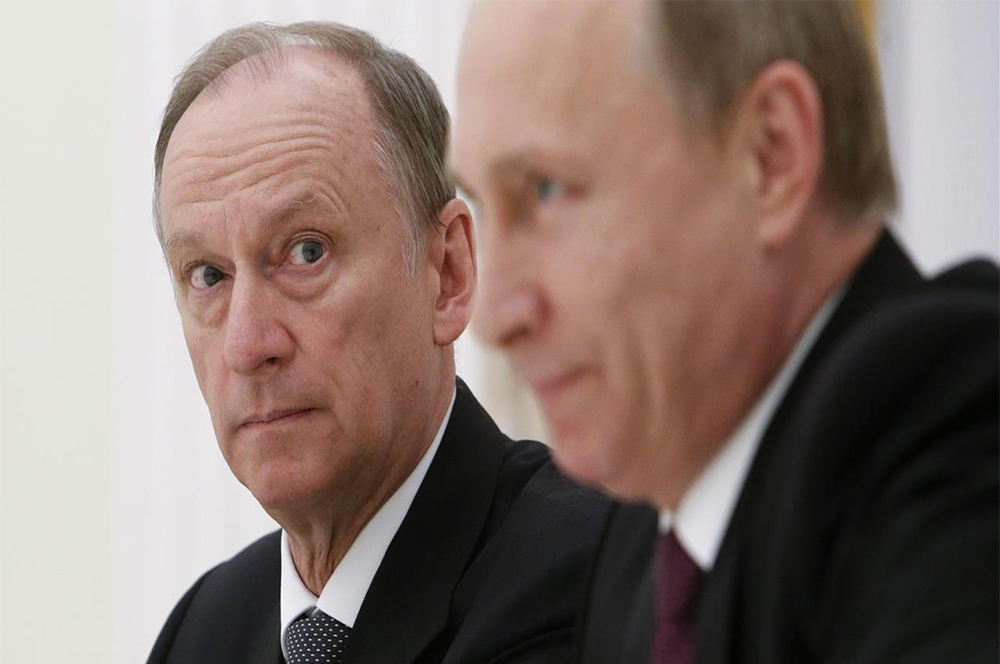A fellow son of Saint Petersburg — in those days, Leningrad — Nikolai Patrushev climbed the ranks in Russian intelligence in step with Putin. Sergei Shoigu, a fixture in the public eye for more than a quarter century who helped pave Putin’s political path, went from frenetic emergency minister to leader of an emboldened Russian military. The old-guard pair, representing Russia’s muscular security and war-fighting powers, have outlasted turmoil to remain at Putin’s side — and both are in play to step in if there is a sudden vacancy at the top.
At this point, Prime Minister Dmitry Medvedev is the heir apparent and would ascend constitutionally, at least temporarily, if Putin disappeared tomorrow. The Saint Petersburger who rose through the Kremlin while also serving as chairman of the board for state oil giant Gazprom served a term as president from 2008–2012 — with Putin watching closely over his shoulder. But when Putin returned to the presidency, the somewhat more liberal Medvedev was seen to have not exactly aced his leader-in-waiting test. And his political star seems to be falling, leaving the door open for other longtime Putin intimates.
Shoigu, an ethnic minority Tuvan, grew up near Mongolia, yet has risen in a system dominated by ethnic Russians. He first became a minister in 1991, when Putin was working in Saint Petersburg city hall, and now stands as Russia’s longest-tenured national government official. A Boris Yeltsin loyalist, he was a visible emergency minister in the 1990s, tending to natural and man-made disasters across the sprawling federation. Named by Yeltsin as head of the Unity party, Shoigu’s success in the 1999 Duma elections helped create the coalition that allowed Putin to win the presidency outright in 2000.
“Shoigu has never tried to stand out from the crowd — all the more remarkable given that Putin partly owes his presidency to him,” wrote Mikhail Zygar in All the Kremlin’s Men: Inside the Court of Vladimir Putin. The two men spent time together at the hockey rink and on wilderness trips. Shoigu even helped stage the famous 2009 photo of Putin shirtless atop a horse, according to Zygar. In 2012, Putin appointed Shoigu to head the military.
Shoigu passed a major test in 2014 when Putin ordered the “returning” of Crimea to Russia, and has continued to puff out the military’s chest. He recently boasted that Russia has tested 162 different types of weapons in Syria, where it intervened on behalf of Bashar Assad, much to the consternation of “the West.”
The Kremlin watchers at Minchenko Consulting position Shoigu as an inner-circle fixture every year in the “Politburo 2.0” report on the government’s rising and falling stars. “No matter what, he’s going to be an important part of the transition process,” says Nikolas K. Gvosdev, professor of national security studies at the U.S. Naval War College, given Shoigu’s tenure and experience. The biggest question is whether the 61-year-old, never one to appear overly ambitious, wants to trade his military uniform for a presidential suit.
Even at the Kremlin, where U.S. sentiment is not exactly genial, Patrushev’s thorny rhetoric stands out. With his retreating hairline and wide nose, Russia’s security council secretary is known for delivering harsh assessments of America and the West. He blames the U.S. for the war in eastern Ukraine — where pro-Russia separatists have battled the government for three years — and says the country’s goal is for Russia not to exist as a state. “Global instability is growing precisely because the West continually seeks to solve its problems at the expense of others,” Patrushev told Kommersant, a leading Russian newspaper, in 2015.
Mikhail Korostikov, a foreign affairs journalist for Kommersant, says Patrushev’s views are an outlier. “He’s living in his small world where Russia is surrounded by enemies and … the first thing the American president is thinking about when he wakes up is how to destroy Russia,” Korostikov says. “Putin, he likes to use this rhetoric sometimes for domestic purposes, but he doesn’t really believe in it. Neither does anyone among Russian leadership.”
The West has greeted Petrushev, 65, with mutual suspicion. British authorities linked him to the 2006 killing of former Russian spy Alexander Litvinenko — an inquiry the Kremlin rejected as a smear job. In 2014 the European Union issued travel and financial restrictions on Patrushev for his role in the Ukraine crisis as part of a series of sanctions on Putin’s inner circle. Yet he has survived purges of the upper ranks, including Putin’s sacking of his chief of staff last year. “He certainly has the standing and knows where the bodies are buried — literally,” says Jeffrey Mankoff, a Russia expert at the Center for Strategic and International Studies, a Washington think tank.
Medvedev could be tossed aside amid a growing corruption scandal, with opposition leaders targeting his vast wealth, though one analyst says he has a deal to stay on through the 2018 elections. If Medvedev is sacked, the Putin-approved replacement would have an edge in a power struggle to come, be it Patrushev, Shoigu or another Kremlin insider.

